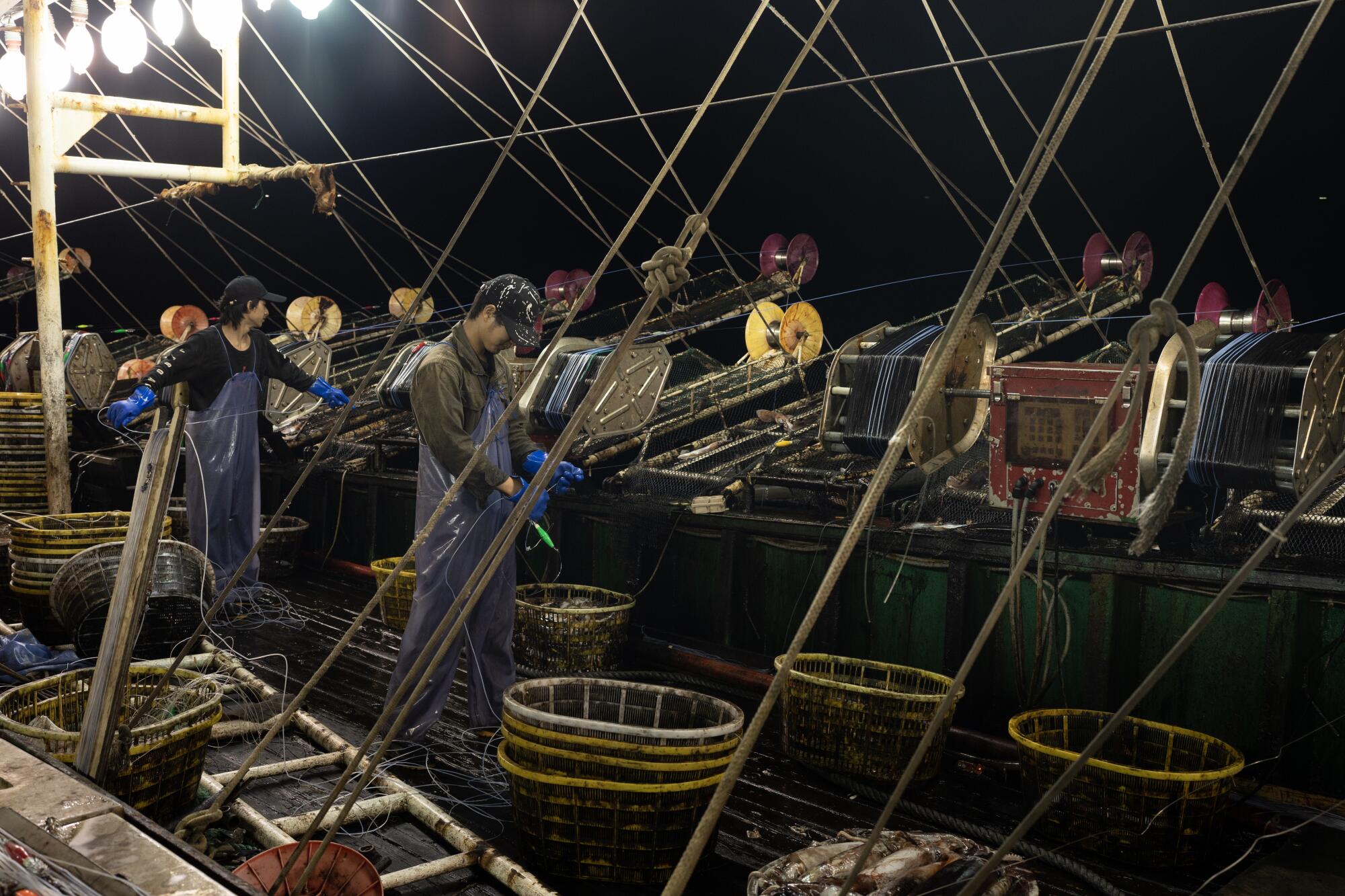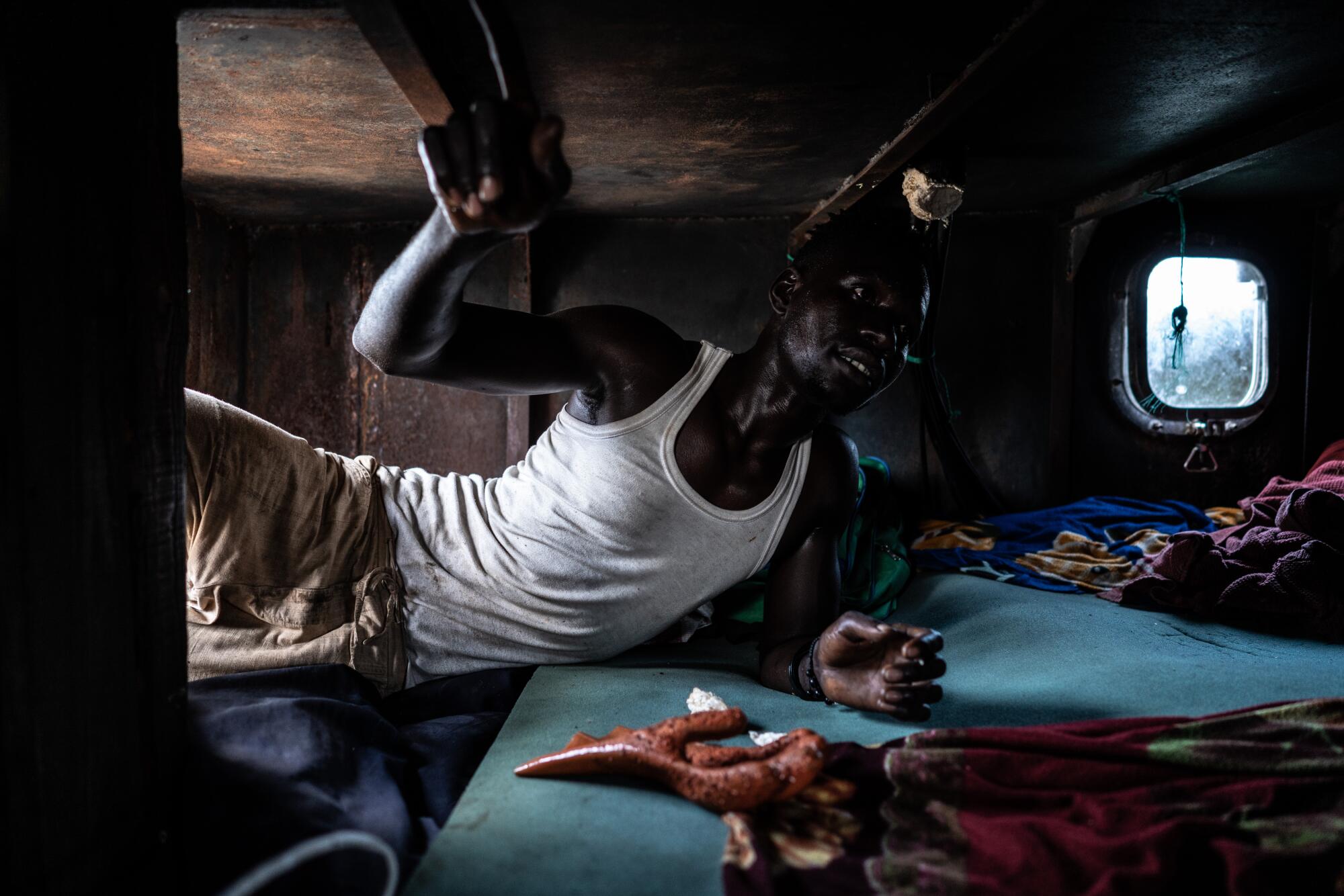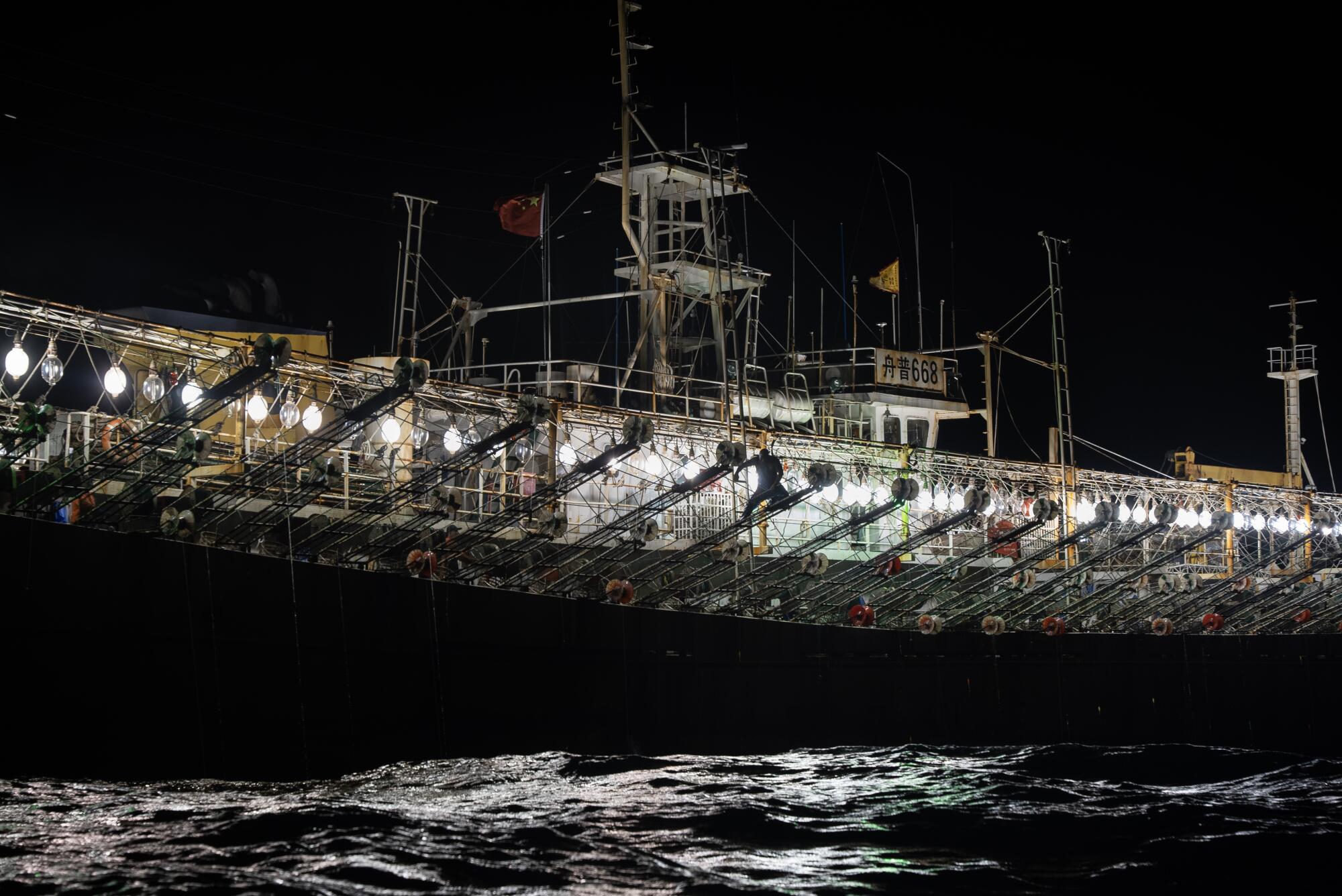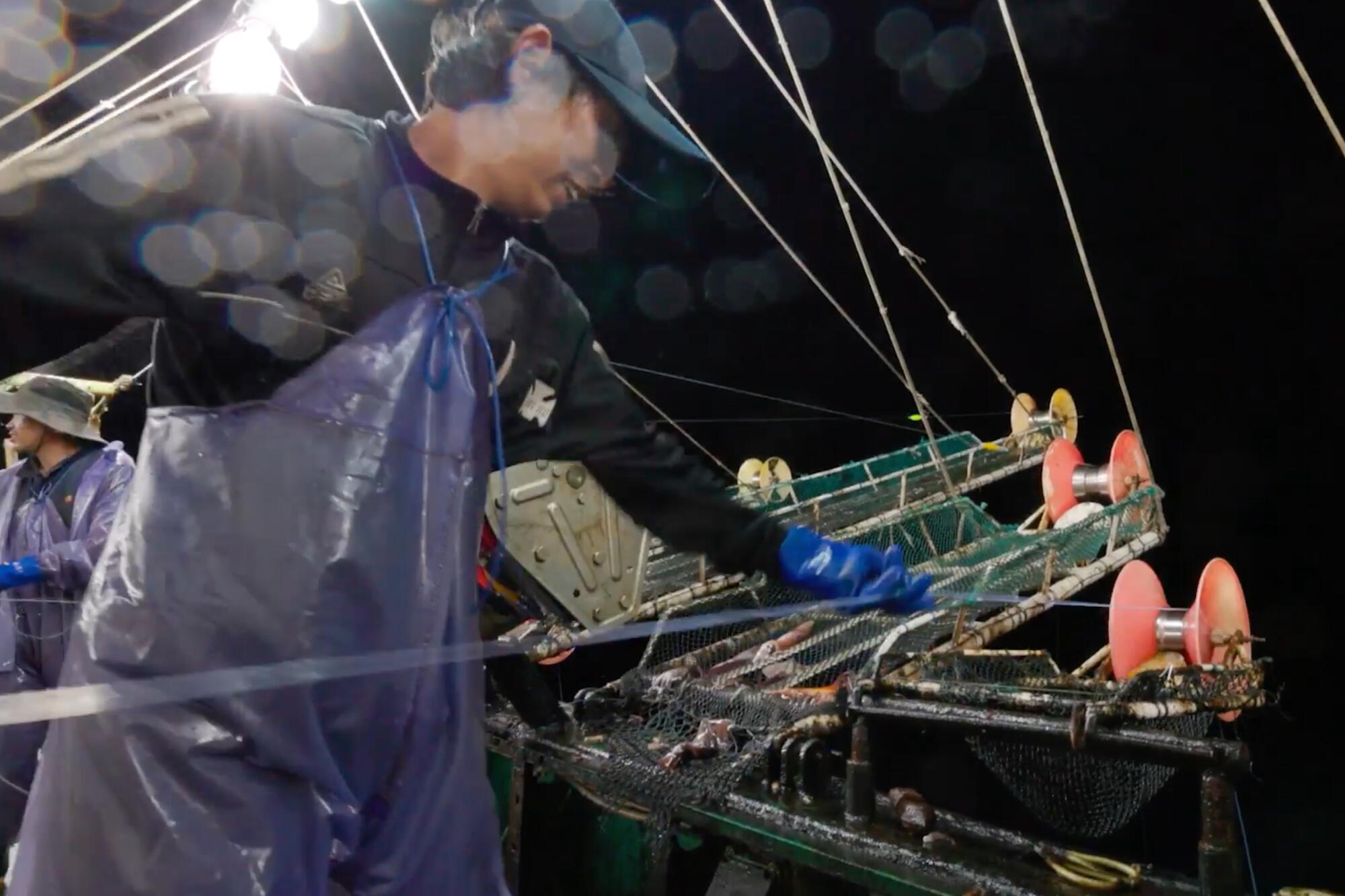On the excessive seas roughly a thousand miles north of the Falkland Islands, an 18-year-old Chinese language deckhand engaged on a Chinese language squid ship nervously ducked right into a darkish hallway to whisper his plea for assist.
“Our passports have been taken,” he stated to the reporters who had simply come aboard. “They gained’t give them again.”
Fearing he can be overheard, he typed out a message on his cellphone: “Can you’re taking us to the embassy in Argentina?”
Few workplaces are as brutal as distant-water fishing ships from China, and there are a number of them: The nation in the present day operates the world’s largest fleet, which is greater than double the dimensions of its subsequent competitor. It’s hardly ever straightforward for crew members to depart these ships, and infrequently it’s forbidden. Employees on China’s huge armada of squid ships, which make up nearly all of the vessels within the fleet, sometimes spend two years nearly solely at sea, more often than not with no web or telephone sign.
China is extensively accepted to be the world’s worst purveyor of illegally caught seafood, and its practices have acquired a lot consideration that the nation has taken steps within the final a number of years to scale back such violations. However the human rights abuses going down on its ships — far out at sea, away from public view — have attracted much less discover and so stay rampant.
Workdays routinely final 15 hours, six days every week. Crew quarters are cramped, with 10 males bunking in rooms constructed for half that quantity. Accidents, malnutrition, sickness and beatings are frequent, in line with interviews with dozens of crew members on the ships.
Often, crew members have escaped and reported on circumstances themselves. In 2014, for example, 28 Africans fled a Chinese language squidder referred to as the Jia De 1 whereas it was anchored within the Uruguayan capital, Montevideo. A few of them later advised native reporters they’d been overwhelmed on the ship. One, who described having been chained up when not working, confirmed reporters what he stated have been shackle marks round his ankles. On the time, the proprietor of the ship denied having mistreated the crew in any approach.

The crew aboard a Chinese language fishing vessel use jigs and vibrant lights to catch squid at evening on July 7, 2022.
(Ed Ou / The Outlaw Ocean Undertaking)
“The instances I see don’t are inclined to seem like accidents,” stated Jesica Reyes, whose job as an interpreter for Indonesians in Montevideo has given her an up-close view. “They seem like abuse.”
For the final decade, Reyes has fielded lots of of emergency telephone calls from fishing-company brokers, police, deckhands and the Indonesian Consulate, imploring her to get to the port to speak to households of deckhands, line up legal professionals for repatriations or wage disputes and work with police or docs when ships drop off Indonesian crew members who’re sick, injured, disgruntled or useless.
Chinese language officers frequently beat Indonesian deckhands for errors, slights or slowness, Reyes stated. She recounted one case involving an Indonesian named Daniel Aritonang who was dropped off in port in March 2021, after having been transferred from a Chinese language squid ship referred to as the Zhen Fa 7. Barely aware, coated in bruises, his ft swollen from malnutrition, Aritonang had ligature marks from a rope he stated had been tied round his neck. He died on the hospital a number of hours later. Requested in regards to the case, a consultant for Rongcheng Wangdao, the corporate that owns the Zhen Fa 7, stated it discovered no proof of misconduct on the ship: “There was nothing concerning your alleged appalling incidents about abuse, violation, insults to at least one’s character, bodily violence or withheld salaries.”
The U.S. Division of Labor has examined the issue of labor abuse on Chinese language squid ships, concluding in 2020 that many deckhands labored involuntarily underneath circumstances of coercion, fraud, intimidation or debt bondage. In 2021, the Environmental Justice Basis, an advocacy group primarily based in London, launched a report primarily based on interviews with 116 Indonesian crew members from Chinese language ships. Roughly 97% reported experiencing some type of debt bondage or confiscation of paperwork. About 85% reported abusive working and residing circumstances, 70% had skilled intimidation and threats, and 58% had seen or skilled bodily violence.
“The instances I see don’t are inclined to seem like accidents. They seem like abuse.”
— interpreter Jesica Reyes
“The circumstances contained in the boats aren’t one of the best, and the work is hard,” stated Nicolas Potrie, who runs the Indonesian Consulate workplace in Montevideo, including that injured or sick staff who’re dropped off in port are sometimes reluctant to elucidate what occurred to them, fearing retribution. Given these circumstances, China has struggled lately with strikes, mutinies and violence on its squid ships, which feed the world’s rising demand for calamari.
To receives a commission in full, crews on Chinese language fishing ships normally have to finish your complete time period of their contracts, which frequently embody heavy monetary penalties for making an attempt to depart prematurely. Such a provision in a job contract violates anti-trafficking legal guidelines within the U.S. and Indonesia, in line with labor legal professionals in each nations.
When Chinese language fishing ships go to their waters, some nations have been reluctant to offer asylum or secure passage for injured, sick or disgruntled crew members searching for to disembark, as a result of such instances elevate difficult diplomatic challenges over whether or not the employees ought to be allowed to remain or be despatched again dwelling. In October 2015, for instance, the Chinese language crew on a squid jigger referred to as the Ningtai 89 went on strike after the ship proprietor tried to pay decrease wages than he initially promised. The crew members insisted that they needed to disembark and be flown dwelling, however the firm balked.
The strike quickly escalated right into a mutiny, with the crew forcing the ship into the Peruvian port of Callao — the place the navy pushed the vessel again out to sea. The crew compelled the ship again into the port, this time working it aground. Native police thought of the occasion an unlawful entry, and the Overseas Ministry, citing violations of the nation’s immigration procedures, lodged a criticism with the Chinese language Consulate. 5 days later, the crew was allowed entry into Peru and flown to China, the place the chief of the strike was prosecuted and convicted of hijacking.

To chronicle circumstances on Chinese language distant-water squid ships, a staff of reporters boarded greater than two dozen vessels at sea to talk with crew members or pulled alongside vessels to interview Chinese language officers by radio. In lots of cases, the Chinese language ships bought spooked, pulling up their gear and fleeing the scene, and the reporters trailed the ships in a smaller and quicker skiff to get shut sufficient to throw onto their aft decks a plastic bottle weighed down with rice. Every bottle contained a pen, cigarettes, arduous sweet and interview questions written in English, Chinese language and Indonesian. On a number of events, deckhands wrote replies, offering telephone numbers for household again dwelling, after which threw the bottles again into the water. The reporting included interviews with their relations, and with two dozen further crew members.
On the Lu Lao Yuan Yu 010, a Chinese language trawler fishing on the North Atlantic Ocean off the coast of Gambia, a Senegalese deckhand named Lamin Jarju gave a tour of his residing quarters, a nest of crumpled newspapers, clothes and blankets situated exterior atop the roof of the wheel room. As he entered, a rat scurried out from underneath a tarp. A number of crew members, he defined, had been sleeping in these quarters ever for the reason that captain employed extra staff than the ship might accommodate. “They deal with us like canines,” Jarju stated. The ship’s proprietor, Qingdao Tangfeng Ocean Fishery, declined to reply to questions.

Aboard the Victory 205 on Sept. 2, 2019, six crew members from Sierra Leone and Gambia slept in a crawl area between the engine room and wheelhouse.
(Fabio Nascimento / The Outlaw Ocean Undertaking)
On a special Chinese language trawler within the space, the Victory 205, African deckhands confirmed the place eight males slept in an area meant for 2. The 4-foot-tall steel-sided compartment sat immediately above the engine room, which made it dangerously sizzling. When excessive waves crashed on board, water flooded the makeshift cabin, the place, the employees stated, {an electrical} energy strip had twice sparked, practically setting their mattresses on fireplace.
In Punta Arenas, Chile, a dozen rusty Chinese language squid ships have been anchored a mile from port. The vessel carrying the staff of journalists was crewed primarily by Chileans, who pointed to one of many anchored ships and recounted lately watching the Chinese language captain punch and slap deckhands who seemed to be Filipinos or Indonesians. The captain stopped solely after the Chileans started screaming at him. “It was brutal, like quarter-hour straight of beating,” one stated.
Roughly 350 miles west of the Galapagos Islands, within the Pacific Ocean, the reporters bought a close-up take a look at the circumstances aboard a Chinese language squid ship.
On deck, each side of the vessel have been festooned with 300 or extra bowling-ball-sized mild bulbs, which held on racks for the aim of attractive squid up from the depths. At evening, when the bulbs have been turned on, the impact was blinding and made the encircling blackness really feel stark, timeless, otherworldly. The glow of a squid boat with its lights on is seen at sea to the bare eye greater than 100 miles away.

Lights are strung alongside the perimeters of ships to draw squid to the floor of the water, the place they will extra simply be caught.
(Ed Ou / The Outlaw Ocean Undertaking)
Scores of fishing traces prolonged out into the water underneath the lights, every bearing a specialised squid hook, often known as a “jig.” When a squid latched onto a line, the reel mechanically flipped it onto a steel rack. The deckhands then tossed it into plastic baskets for sorting. Usually these baskets overflowed, and the deck ground crammed shin-deep with squid, leaving just about no place left to stroll. The squid grew to become translucent of their remaining moments, their pores and skin shedding its pale crimson tint, generally accompanied by a remaining hissing or coughing sound
The stink and stain of squid are just about not possible to scrub from garments. Greater ships have laundry machines, however on smaller ones, the crew members tie their soiled garments collectively to kind an extended rope, sometimes stretching 20 ft, that they drag for hours within the sea behind the ship.
When the crew members weren’t fishing, they weighed, measured, washed, sorted, eviscerated or packed the squid into steel trays for freezing and bagging. They ready bait by carving up caught squid, separating the tongues from contained in the beaks and slicing out the gentle tissue across the beaks. Beneath deck, they’d every day duties: sweeping hallways, scrubbing bathrooms, mopping showers.
The ship had been at sea for 4 months and had lengthy since run out of greens and fruit.

Because the starting of the pandemic, the Chinese language distant-water fishing fleet has shifted away from recruiting overseas deckhands, relying as a substitute totally on Chinese language staff, a lot of them from rural and inland areas of the nation. Greater than 292 million individuals migrated in 2021 inside China.
On Zhihu, an nameless Chinese language question-and-answer web site just like Quora, former crew members from these ships routinely warn about circumstances on the vessels. Posts on the web site describe debt-bondage schemes through which labor recruiters goal farmers and manufacturing unit staff. In a cautionary video posted in 2020, a narrator recounted what he described as a pal’s experiences engaged on a distant-water squid ship. “At all times be cautious of those offshore fishing firms’ schemes,” he stated, noting that common work days final 13 to 14 hours however that when the squid are ample, deckhands have to remain awake for 3 straight days and nights. Labor recruiters generally goal the determined. One current on-line commercial for a job on a Chinese language squid ship stated: “If you’re in debt, your loved ones has shunned you, you don’t need to be appeared down on, flip off your telephone and keep far-off from dry land.”
Deckhands are sometimes lured to port cities with guarantees of profitable contracts, solely to find that to get a job they must pay a collection of charges, sometimes upfront or with a mortgage from brokers who recruit staff for jobs at sea, in line with a information story printed on-line by Shandong Tv in April 2015. These charges, which quantity to a number of months of wages, cowl such bills as journey to the ship, job coaching, insurance coverage, bedding, crew certifications, medical checkups, meals and protecting workwear.
“If you’re in debt, your loved ones has shunned you, you don’t need to be appeared down on, flip off your telephone and keep far-off from dry land.”
— recruitment advert concentrating on the desparate
Complicated or deceptive contracts have resulted in quite a few courtroom instances. In a research of labor disputes involving business fishing between 2016 and 2020, the Ningbo Maritime Court docket in Zhejiang province discovered that almost all — 180 out of 267 — involved labor contracts, sometimes involving crew members who had left their ships earlier than their contracts had expired, actually because the captain had allegedly reneged on promised pay. The research discovered that vaguely written or verbal contracts make it just about not possible for staff to gather unpaid wages and harm compensation.
China’s Supreme Court docket has additionally weighed in on the state of affairs, declaring in 2020 that higher safety was wanted for “wages, remuneration, and different related bills [that] relate to the fundamental survival, bodily and psychological well being, and private dignity of seafarers.”
Nonetheless, solely hardly ever does the press in China spotlight labor circumstances aboard the nation’s fishing fleet. “A seafarer’s labor dispute gained’t be simply observed by the general public, except there’s a protest or some form of high-profile case,” stated Yin Chi, a former decide from China now primarily based on the NYU College of Legislation.
One such case, which riveted the nation for weeks, was a grotesque mutiny that came about aboard the Lu Rong Yu 2682 in 2011. The lead mutineer was a deckhand named Liu Guiduo. Earlier than departing from Shidao port, Liu, a three-pack-a-day smoker, had purchased 165 cartons of cigarettes from the captain on credit score, stacking them subsequent to his bunk, ground to ceiling. After leaving shore, the ship’s captain knowledgeable the crew members that they might not be paid a hard and fast wage, as they’d been promised, however as a substitute would obtain fee primarily based on a share of their catch. After realizing that his earnings most likely wouldn’t even cowl what he owed for the cigarettes, Liu recruited 9 different crew members to take the captain hostage.
Over the following 5 weeks, the ship break up into warring factions that noticed males disappearing at evening, crew members tied up and tossed overboard to drown, and engine gear sabotaged, in line with Chinese language information studies and courtroom data. Stranded at sea, the crew members ultimately managed to revive the ship’s communications system and transmit a misery sign, drawing two Chinese language fishing vessels to their support. Eleven of the unique 33 males made it again to shore.
In 2013, 5 of the accused, together with Liu and the ship’s captain, have been sentenced to dying, one crew member was given a suspended dying sentence, and the opposite 5 acquired phrases of between 4 years and life in jail.

China has taken some restricted steps lately to stop strikes, mutinies and violence on its fishing ships. Police departments in Chinese language port cities have begun utilizing satellites to speak immediately with some distant-water fishing vessels, even monitoring real-time onboard surveillance video.
In March 2020, a dozen Chinese language staff on a Chinese language squid ship anchored close to the coast of Peru went on strike, annoyed at not with the ability to return dwelling due to China’s pandemic controls. The Chinese language fishing firm contacted the police in Zhejiang province, who spoke on to the crew by satellite tv for pc telephone. The police officer who listened to their grievances organized for a psychologist to carry remedy classes with the crew members remotely to assist alleviate their stress.

A crew member on a fishing boat pulls in squid.
(Ben Blankenship / The Outlaw Ocean Undertaking)
The police officer additionally defined to the employees that their choices have been to switch to different vessels and are available dwelling on a provide ship, which might take a couple of month, or to return to shore in Peru and fly again to China, however at their very own expense. The lads opted to return to work and stick it out.
Some provinces in China fund medical ships to shadow distant-water fishing fleets primarily based of their ports. “If a affected person is simply too sick for us to deal with, we drop him in Peru,” an officer on the bridge of the Zhe Pu Yuan 98, a squid ship that doubles as a floating hospital, stated over the radio when visited by a reporter roughly 400 miles from the Galapagos within the Pacific Ocean. In 2021, the Zhe Pu Yuan 98 changed the Pu Yuan 801, which over the earlier 5 years had handled practically 300 crew members, escorted greater than 20 critically ailing crew members to the port of Lima and accomplished the rescue of 5 fishing boats that had misplaced energy.
The Chinese language authorities has additionally tried to handle mental-health points that contribute to violence on such ships. In June 2018, a Chinese language crew member on a Chinese language squid ship anchored in Peruvian waters bought right into a knife struggle with a Filipino colleague, throughout which the Filipino jumped overboard to his dying. The Chinese language authorities responded by creating in Chimbote, Peru, a Communist Celebration chapter particularly for fishing-boat staff overseas. The aim of the chapter was, in line with the occasion department secretary, to keep away from comparable violence by bettering the morale of squid-fishing crews overseas and by bolstering the “religious sustenance, assist in life, and safety in manufacturing.”

On the Chinese language squid ship north of the Falklands, the place in February 2022 the 18-year-old begged to be taken to the Chinese language Embassy in Argentina, one other deckhand, who was 28, defined that it was his first time at sea. He earned $883 per thirty days, including that if he and his fellow deckhands missed a day of labor for illness or harm, they have been docked two days’ pay.
“It’s not possible to be blissful,” he stated. “We care about nothing as a result of we don’t need to be right here, however we’re compelled to remain.” He estimated that 80% of the lads would depart in the event that they have been allowed. “It’s like being remoted from the world and much from fashionable life.”
A minder who saved watch on the lads was quickly referred to as away, which allowed the deckhands to proceed their frank alternate with the reporter. “I can’t disclose an excessive amount of proper now given I nonetheless must work on the vessel, if I give an excessive amount of info it’d probably create points onboard,” the 18-year-old wrote on his cellphone. “Please contact my household,” he stated, earlier than abruptly ending the dialog when the minder returned.
Port data in Montevideo provided little further details about the 18-year-old’s ship, besides to point that it had dropped off a useless employee in April 2019. Contacted at her dwelling in Fujian province, the older sister of the 18-year-old deckhand was advised of his plea for assist. “My coronary heart actually aches,” she stated.
She defined that being from inland, she and her household knew little in regards to the fishing business, although they’d been skeptical and had begged her brother to not work at sea. That they had inspired him to contemplate different choices, together with being a police officer, however he was drawn to the thought of seeing different nations.
“He’s actually too younger,” she stated. “And now there’s nothing we will do, as a result of he’s so far-off.”
#Chinese language #squidfishing #crews #search #escape #beatings
